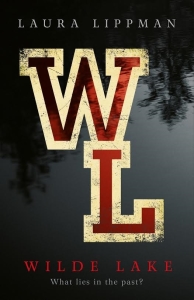Wild Lake – Laura Lippman
 ‘Wilde Lake’, the latest stand-alone novel by Laura Lippman, the multi award-winning author of the Tess Monaghan series and of ‘What the Dead Know’, is a gripping story about a murder, its investigation and solution. A sophisticated novel featuring a skilfully woven plot, clever psychological insights, well-crafted characters (a feisty state’s attorney and her family, a mentally unstable suspect, an embattled defence lawyer) and a stunning denouement. End of crime novel review.
‘Wilde Lake’, the latest stand-alone novel by Laura Lippman, the multi award-winning author of the Tess Monaghan series and of ‘What the Dead Know’, is a gripping story about a murder, its investigation and solution. A sophisticated novel featuring a skilfully woven plot, clever psychological insights, well-crafted characters (a feisty state’s attorney and her family, a mentally unstable suspect, an embattled defence lawyer) and a stunning denouement. End of crime novel review.
But ‘Wilde Lake’ is also an entirely different creation, a rare novel that shows once again how brilliant Laura Lippman is at giving her readers more than they’ve bargained for. More subtext, more insight, and a deeper perspective on how we live our lives, what we hope for and what we fear.
To do so, Lippman bravely chooses to give pride of place in her story to something which, though part and parcel of any crime novel, is rarely dwelled upon: bereavement, and the comfortless grief that comes with it. Bereavement is what usually follows a crime, and has little do to with solving it. But Lippman’s greatest accomplishment in ‘Wilde Lake’ is precisely that of exploiting a savage crime, the murder of middle-aged Mary McNally in her home in suburban Baltimore, as the device through which to explore how her characters deal not just with present challenges but also with past loss and unrequited grief. And in doing so, allowing the readers to ask themselves questions on how you deal with the sorrows great and small that the passage of time inflicts on us.
The past and the present interact continuously throughout the novel, and another achievement of Lippman’s is to infuse both time-frames with enough narrative tension to prevent this back-and-forth in time to slow down the pace of the story. The plot develops in fairly brief chapters alternating from the protagonist’s childhood, adolescence and teenage years to the present day, when Luisa ‘Lu’ Brant has just been elected as the first female state’s attorney in Howard County, Maryland.
A challenging position to be in, her tenure kicking off with the Mary McNally murder enquiry, in which the incumbent state’s attorney she defeated is acting as defence lawyer. But Luisa Brant is definitely up to it: she’s strong-willed, smart and courageous. She’s also a widow caring for young twins with the help of her father, himself a long-time widower and a legendary former state’s attorney of Howard County.
Luisa lost her mother only a week after her birth, and her husband only a few years before the story starts. He was only 39. Her whole life has been an exercise in coping with bereavement, and she has developed strategies for it. Above of all, with the help of her family: her dignified, steadfast father, her older brother AJ, at once protective and revered. And mostly through her own courage in going on and forward, seeking for new challenges to give sense to her life.
Luisa is a truly great character, a successful professional with the wisdom never to forget that all she has achieved cannot be entirely of her own making, for as single individuals we can count for very little.
Yet our relationship with those closest to us, as the novel shows, can be a double-edged sword, for we are rarely more blind than when we deal with the emotions that run deepest in our heart. This is brilliantly narrated by Lippman, painting the retrospective picture of Luisa’s home life in her younger years as the state’s attorney prepares her case against Mary McNally’s murder suspect, Rudy Drysdale, a local homeless man who’s not exactly the brightest bulb in the box.
I’ve rarely read such a skilful deconstruction of a normal, unlucky family’s precariously balanced evolution. Luisa’s father is at once a devoted and uncompromising single parent, and a man carefully hiding his ways of coping with the grief at losing his young wife. Luisa’s older brother AJ is a larger-than-life figure for Luisa, so large in fact that some of his own, all too human failings remain hidden from her for very long. AJ also has a cast of beguiling close friends, each of them, so the reader and Luisa gradually discover, with unsettling secrets of his own.
The blend of the Brant family’s harrowing story, overshadowed by a tragic death that occurred at AJ’s high school graduation celebrations, and Luisa’s efforts to determine whether Rudy Drysdale is guilty of murder, and if he is, whether his mental health had an influence on the crime, make for a truly remarkable novel. You could label it as a subtle psychological thriller, or an unconventional police procedural novel, or a piece of literary fiction about family relationships and the power of grief and love. Whatever the label, Laura Lippman’s ‘Wilde Lake’ remains a great accomplishment at any of these levels, and a truly brilliant read.




